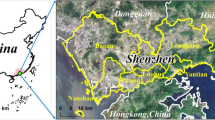Abstract
The dockless shared bikes flourish as a new concept in recent years. It allows users to find bikes anywhere via a GPS-based mobile application, and flexible cycling and parking the bikes in the same way. From the bike trajectory data produced by Users, we can extract bike flow patterns for better urban planning and Point-of-Interest (POI) recommendation. In this paper, through conducting the spatio-temporal representations of bike activity acquired from bike trajectory logs, we first design a graph clustering model With sparsity constraints that combine time information to explore potential patterns of bike flow. Next, by comparing historical trajectory logs and POI information with the flow patterns, we dig out several typical categories of bike flow patterns, which can give suggestions for further urban planning and POI recommendation. Further, our experiments via Mobike trajectory data demonstrate the effectiveness of bike flow pattern discovery.
Access this chapter
Tax calculation will be finalised at checkout
Purchases are for personal use only
Similar content being viewed by others
Notes
References
Ai, Y., et al.: A deep learning approach on short-term spatiotemporal distribution forecasting of dockless bike-sharing system. Neural Comput. Appl. 31, 1–13 (2018)
Ankerst, M., Breunig, M., Kriegel, H., Ng, R., Sander, J.: Ordering points to identify the clustering structure. In: Proceedings of ACM SIGMOD, vol. 99 (2008)
Bao, J., He, T., Ruan, S., Li, Y., Zheng, Y.: Planning bike lanes based on sharing-bikes’ trajectories, pp. 1377–1386 (2017)
Bauer, S., Noulas, A., Seaghdha, D.O., Clark, S., Mascolo, C.: Talking places: modelling and analysing linguistic content in foursquare, pp. 348–357 (2012)
Ester, M., Kriegel, H.P., Xu, X.: A density-based algorithm for discovering clusters a density-based algorithm for discovering clusters in large spatial databases with noise (1996)
Gast, N., Massonnet, G., Reijsbergen, D., Tribastone, M.: Probabilistic forecasts of bike-sharing systems for journey planning, pp. 703–712 (2015)
Hasan, S., Ukkusuri, S.V.: Urban activity pattern classification using topic models from online geo-location data. Transp. Res. Part C-Emerg. Technol. 44, 363–381 (2014)
Hong, L., Zheng, Y., Yung, D., Shang, J., Zou, L.: Detecting urban black holes based on human mobility data. In: Proceedings of the 23rd SIGSPATIAL International Conference on Advances in Geographic Information Systems, p. 35. ACM (2015)
Kanaanizquierdo, S., Ziyatdinov, A., Pereralluna, A.: Multiview and multifeature spectral clustering using common eigenvectors. Pattern Recogn. Lett. 102, 30–36 (2018)
Liu, J., Sun, L., Chen, W., Xiong, H.: Rebalancing bike sharing systems: a multi-source data smart optimization, pp. 1005–1014 (2016)
Liu, Z., Shen, Y., Zhu, Y.: Where will dockless shared bikes be stacked?:—parking hotspots detection in a new city. In: Proceedings of the 24th ACM SIGKDD International Conference on Knowledge Discovery & Data Mining, pp. 566–575. ACM (2018)
Pan, L., Cai, Q., Fang, Z., Tang, P., Huang, L.: Rebalancing dockless bike sharing systems. CoRR abs/1802.04592 (2018). http://arxiv.org/abs/1802.04592
Tian, F., Gao, B., Cui, Q., Chen, E., Liu, T.: Learning deep representations for graph clustering, pp. 1293–1299 (2014)
Yang, Z., Hu, J., Shu, Y., Cheng, P., Chen, J., Moscibroda, T.: Mobility modeling and prediction in bike-sharing systems, pp. 165–178 (2016)
Yuan, N.J., Zheng, Y., Xie, X., Wang, Y., Zheng, K., Xiong, H.: Discovering urban functional zones using latent activity trajectories. IEEE Trans. Knowl. Data Eng. 27(3), 712–725 (2015)
Zhou, X., Noulas, A., Mascolo, C., Zhao, Z.: Discovering latent patterns of urban cultural interactions in WeChat for modern city planning. In: Knowledge Discovery and Data Mining, pp. 1069–1078 (2018)
Author information
Authors and Affiliations
Corresponding author
Editor information
Editors and Affiliations
Rights and permissions
Copyright information
© 2019 ICST Institute for Computer Sciences, Social Informatics and Telecommunications Engineering
About this paper
Cite this paper
Ling, C., Gu, J., Sun, M. (2019). Latent Flow Patterns Discovery by Dockless Bike Trajectory Data for Demand Analysis. In: Zhai, X., Chen, B., Zhu, K. (eds) Machine Learning and Intelligent Communications. MLICOM 2019. Lecture Notes of the Institute for Computer Sciences, Social Informatics and Telecommunications Engineering, vol 294. Springer, Cham. https://doi.org/10.1007/978-3-030-32388-2_54
Download citation
DOI: https://doi.org/10.1007/978-3-030-32388-2_54
Published:
Publisher Name: Springer, Cham
Print ISBN: 978-3-030-32387-5
Online ISBN: 978-3-030-32388-2
eBook Packages: Computer ScienceComputer Science (R0)




